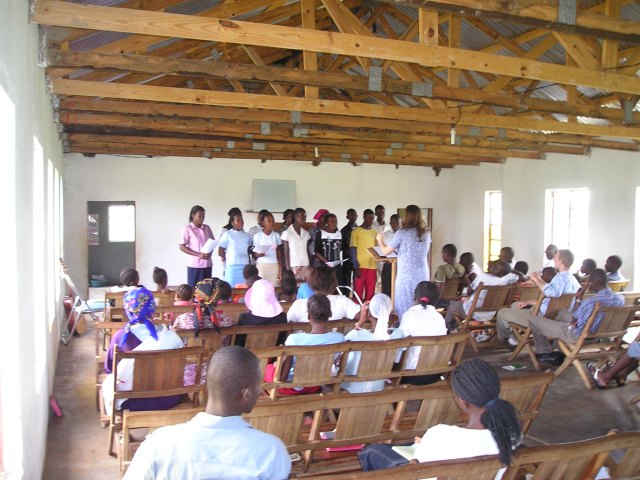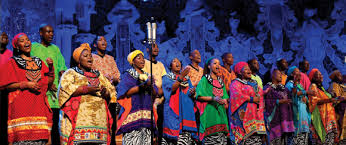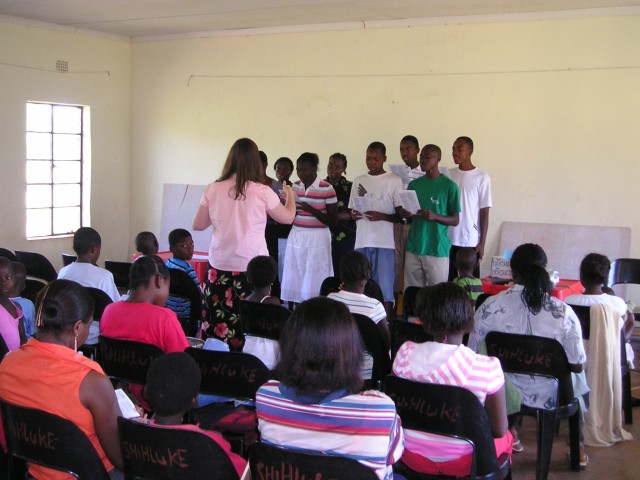 |
| My first choir |
How can you improve a choir? There are two ways:
- Help one of the singers who is already in the choir.
- Add new singers.
We just celebrated
10 years of service in Africa,
and I mentioned that I'd be sharing verses that have kept us
persevering in spite of trials and slow growth. Revelation 5:9-10 tops
the inspiration list.
And they sung a new song,
saying, Thou art worthy to take the book, and to open the seals thereof:
for thou wast slain, and hast redeemed us to God by thy blood out of every kindred, and tongue, and people, and nation; And has made us unto our God kings and priests: and we shall reign on the earth.
John Sees Heaven
Imagine
this picture with me (or with John). John, overwhelmed with a vision of
a beautiful, glittering heaven, records details in rapid-fire
succession. So much grabs his eye that no one thing occupies too much
space in chapters 4-5 (which form a complete unit). But the first thing
that catches his eye is a throne and the
One who sits on it.
He
describes a heavenly scene using at least 12 different colors, sounds,
and symbols. Some colors he describes with the word "like," implying
that perhaps the actual colors are far more beautiful--like C.S. Lewis
describing in
The Last Battle how the fruit in Aslan's world were like strawberries, but SO much better.
Then
chapter five changes focal points: the Lamb is introduced. There are no
"minor" issues here--this is Christ and God. With this as the scenery,
another sense takes over--John hears singing.
John Hears Heaven
Examine this song of praise to Jesus with me for a moment.
- It is emotional. (The Christian life demands passion!)
- It
is artistic. (Cathedral-builders in the medieval ages set figurines in
stained glass high up in corners of the ceiling where no one could see.
Why? "This art is for God.")
- It is doctrinal (covering the
sovereignty of Christ, the atonement, redemption, the kingdom of God,
and focuses on Christ, rather than secondary issues)
Okay, so John sees amazing sights and hears an even more wonderful song; but even
more encouraging for us is the identification of
who he sees and hears!
The Choir
Who is singing? Who is the "they"?
In
verse 8, it's the 24 "elders." These singers are identified by their
relationship to Christ. In verse 10, the singers are the "kings and
priests of God on earth." In verse 9, it's "those who were
redeemed"--all Christians from all time, "out of every kindred and
tongue and people and nation."
Ethonologue catalogued 6,495 living languages as of 2005.
The
Joshua Project catalogues 15, 967 ethnic groups.
The
largest people group is Mandarin Chinese with 793,000,ooo speakers.
India has the most amount of people groups with 2, 327. (350 languages)
One people group in India (the Nai) has 70 alternate names.

So think about this choir with me for a minute... How many people will be there?
Let's
go back to the beginning of the church in Acts. In Acts we read about
3,000 saved on the Day of Pentecost, and at another time, 5,000; then it
says "many" people were added the church "daily." Let's put that number
at about 50,000 people. An average-ly large stadium today could hold
that many people.
So imagine a football stadium full of people looking down on the field. One Man walks to the center, and the
entire stadium rises to its feet and begins a glorious song of praise to that Man.
But
there's more. From 100-300 A.D. we see clear evidence that Christians
were affecting their society. Joshua Project gives a statistic that at
least 2% of a people group is needed before it can impact its society.
So if a group wants to advocate for the spotted owls of North America,
there must be at least 2% of Americans advocating that cause to impact
all of America on that issue. If this statistic is correct, then there
were
at least 200,000 Christians during the early church time
period. (And when you think of Constantine converting his entire army
to Christianity at the end of this time period, it seems that there must
have been more than just 2%.) =
4 stadiums
57 revivals are recorded by Brian Edwards in
Revival. In some of those revivals tens of thousands
were converted. =
2 stadiums
Today
400 million people claim to be Protestant. If we assume that only 20%
of them are actually born again, we have 80 million people.
= 1,600 stadiums
Then we could talk about Old Testament believers or children who died before the age of accountability.
God will build this choir. It cannot fail. There cannot be a final day that does not have this choir. So, how can this encourage us today?
- Trust
that God is working all things to produce this choir, for the good of
this choir--the good and the bad things, the large and small things;
that car accident that killed our only male church member, that man who
shockingly fell out of the ministry; even Robert Mugabe's crazy
leadership in Zimbabwe. He will build this choir, and it will include people from the people group to whom you are ministering!
- What
are you doing to add new singers? When you stand at that final day, the
only thing that will matter is Christ and His glory!

When
I think about being a member of that choir made up of hundreds of
millions of people, and I picture singing a song to Christ with my
dearly beloved family members to my left, and my dearly beloved Tsonga
church members to my right dressed up in national dress carrying their
flag all to the glory of God...it shakes me back to the reality that the
only thing that matters for me right now is what I'm doing to build
that choir!
At that time, I won't think about the yard sales I
couldn't go to in America because I was across the ocean. I won't
remember the slights and accusations others slung our way, whether
deserved or undeserved. I won't think about which singer brought the
most other singers to the choir. I will think about Christ and what He
did. And I will probably regret that more beloved Tsonga people did not
become a part of this beautiful moment.
Are you leading anyone to
"try out" for this choir? What are you doing to add new singers? What
are you doing to help anyone to improve their voice for this choir?
Let's get involved working for the grandest event in all of
history--building the choir that
will sing to the praise of His glorious grace. And never give up working for this!




 So think about this choir with me for a minute... How many people will be there?
So think about this choir with me for a minute... How many people will be there? When
I think about being a member of that choir made up of hundreds of
millions of people, and I picture singing a song to Christ with my
dearly beloved family members to my left, and my dearly beloved Tsonga
church members to my right dressed up in national dress carrying their
flag all to the glory of God...it shakes me back to the reality that the
only thing that matters for me right now is what I'm doing to build
that choir!
When
I think about being a member of that choir made up of hundreds of
millions of people, and I picture singing a song to Christ with my
dearly beloved family members to my left, and my dearly beloved Tsonga
church members to my right dressed up in national dress carrying their
flag all to the glory of God...it shakes me back to the reality that the
only thing that matters for me right now is what I'm doing to build
that choir!
